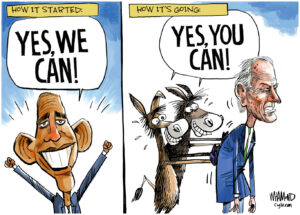What About Syria?
One historical purpose of presidential speeches has been to buy time to give presidents' policies a chance to work out.One historical purpose of presidential speeches has been to buy time to give presidents’ policies a chance to work out. That’s what President Barack Obama did last Monday night with a well-crafted and appropriately tough (or belligerent) speech defending his policies in Libya.
The man gives a great speech.“The president spoke to the nation and made a strong case for why America needed to intervene in this fight — and why that did not always mean it should intervene in others,” said The New York Times in its lead editorial. “Mr. Obama,” said the Times, “said that the United States had a moral responsibility to stop ‘violence on a horrific scale,’ as well as a unique international mandate and a broad coalition to act with. He said that failure to intervene could also have threatened the peaceful transitions in Egypt and Tunisia, as thousands of Libyan refugees poured across their borders, while other dictators would conclude that ‘violence is the best strategy to cling to power.’ “The Los Angeles Times editorialized: “Before President Obama’s address to the nation about Libya, three questions about U.S. involvement there loomed large: Why, among all the places with vulnerable civilian populations, did the U.S. and its allies choose to intervene in Libya? Was the mission designed to prevent civilian suffering or to topple Moammar Gadhafi? How (and how quickly) would the U.S. extricate itself from this engagement?”And, continued that editorial: “In his speech Monday, Obama addressed those thorny questions and many others with cogency and clarity, though not all of the answers were persuasive.”The question these editorials were asking was: “Why is Libya unique, as opposed to other countries, for example Bahrain and Syria?”Obama’s answer was fine as far as it went: A dictator was demonstrating that he would use massive military force against his own people. And what kind of people are we (and other Western countries) if we sit back and watch that happen on television and cellphones, as we did pre-cellphone in Rwanda in 1988?© 2011 Universal Uclick
Your support is crucial...As we navigate an uncertain 2025, with a new administration questioning press freedoms, the risks are clear: our ability to report freely is under threat.
Your tax-deductible donation enables us to dig deeper, delivering fearless investigative reporting and analysis that exposes the reality beneath the headlines — without compromise.
Now is the time to take action. Stand with our courageous journalists. Donate today to protect a free press, uphold democracy and uncover the stories that need to be told.






You need to be a supporter to comment.
There are currently no responses to this article.
Be the first to respond.